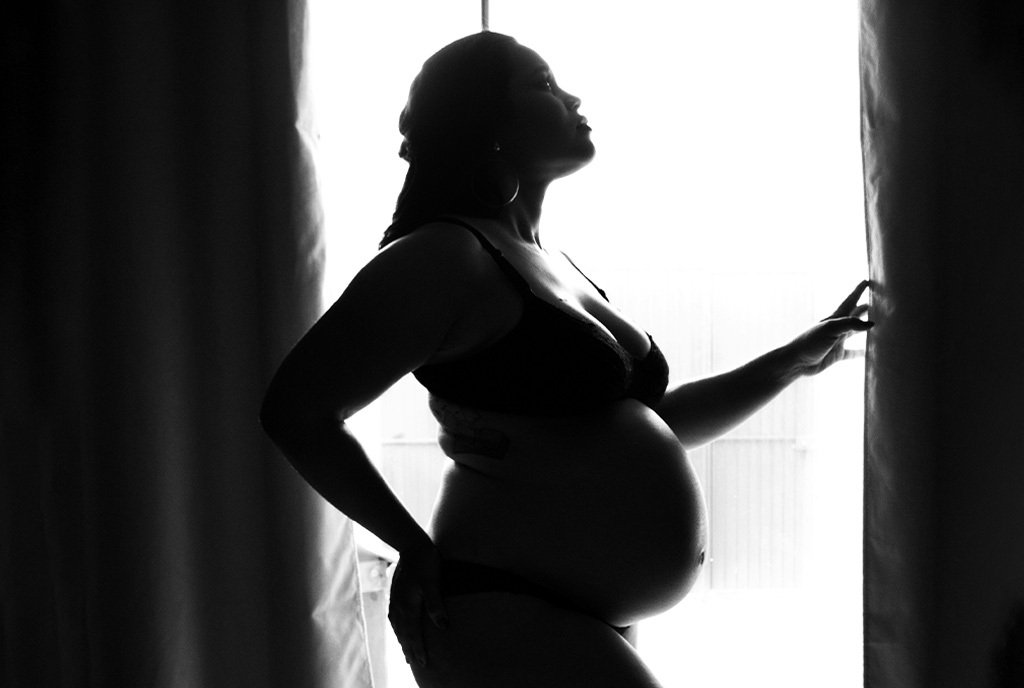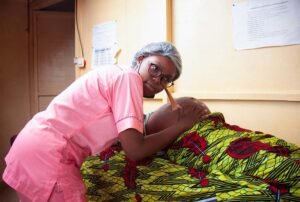
The dismal statistics on maternal health outcomes in the United States are well-known in health justice, health equity, and health philanthropy circles. Among developed nations, the United States has the worst maternal death rate. The maternal mortality rate is 2.5 times higher for Black women than their White counterparts, with Black women and birthing people being three to four times more likely to die during childbirth than their White counterparts.
A small body of research is drawing critical attention to the mental strain attached to the experiences of Black women and birthing people during and following pregnancy.
Black women’s babies are twice as likely to be born premature and, consequently, to die before their first birthday than are babies born to White women. And many American women do not have access to coverage for midwives, doulas, and other community health workers to help them overcome the challenges embedded within the US healthcare system.
Socioeconomic determinants such as household income, housing conditions, employment, and access to health insurance affect maternal health outcomes. However, recent research has revealed that race is even more important than income when it comes to birth outcomes.
Another crucial factor in maternal and infant health: the mental wellbeing of women and birthing people, especially as it intersects with race. A small body of research is drawing critical attention to the mental strain attached to the experiences of Black women and birthing people during and following pregnancy.
The Maternal Mental Health Crisis
According to the Centers for Disease Control and Prevention, the US maternal mental health crisis is the leading cause of maternal deaths. And according to the Association of American Medical Colleges, poor perinatal mental health claims the lives of one in five women in the United States.
Though poor maternal mental health can affect all women, the rates are higher for Black and Indigenous women. Approximately 40 percent of Black women experience mental health symptoms during the perinatal period which includes the onset of pregnancy to one year after the birth of a child.
At its extreme, the mental strife some mothers encounter can lead to substance use disorder, suicide, and infanticide. Most of the women affected never receive treatment.
Research Is Advancing Maternal Mental Healthcare
In April of 2024, a seminal public health journal, Health Affairs, issued a special edition on perinatal mental health and wellbeing and conducted a related briefing. The journal issue and the briefing discussed a range of mental health challenges throughout the pregnancy experience that stretch “beyond postpartum depression.”
The special issue, “Perinatal Health and Well-Being” featured several innovative research studies on perinatal and postpartum mental health issues:
- One study found an almost 400 percent increase in rates of post-traumatic stress disorder in commercially insured pregnant individuals between 2008 and 2020
- A New Jersey study traced the association between a parental diagnosis of prenatal depression and emergency department care for infants in the postnatal year
- Another study addressed the occurrence of perinatal mood disorders in fathers
- Several studies investigated racial and ethnic disparities in maternal mental health, including depressive symptoms, diagnoses, and care
The briefing included interdisciplinary scholarship on the multifaceted issues that result in poor maternal mental health. Some highlights from the briefing include insights on:
- Mental Health Screenings
The briefing emphasized the importance of depression screenings before women are sent home with their infant(s), regardless of whether they showed signs or symptoms during pregnancy. Experts warn, however, that screenings are not a failsafe since pregnant people may not always feel comfortable being candid about their experiences, and issues uncovered in screenings don’t always trigger an intervention.
Also, though screenings are translated into different languages, there is a need to understand how these tools—developed through research with majority-White populations—operate in the field, and whether they are culturally competent beyond the language used.
To better understand pregnant people outside of screenings, panelists also emphasized the importance of maternal health workers who are also people of color so that BIPOC pregnant people feel comfortable enough to disclose their issues and ask for help when they are experiencing psychosocial challenges.
- Improving Mental Healthcare Systems for Pregnant People
Training for people who encounter pregnant people, including obstetricians, gynecologists, and psychiatrists, would also help combat perinatal mental health issues as they arise, but there is currently no professional requirement for training specific to this population. The briefing also recommended using and expanding the number of mental health clinics to create a better mental health infrastructure to support pregnant people.
- Collaboration across Disciplines and Settings
Research partners highlighted in the briefing spanned multiple fields including medicine, midwifery, psychiatry, public health, and social science, among others. This type of interdisciplinary approach was also emphasized by panelists, with some recommending collaborative care models and integrated data systems.
Sign up for our free newsletters
Subscribe to NPQ's newsletters to have our top stories delivered directly to your inbox.
By signing up, you agree to our privacy policy and terms of use, and to receive messages from NPQ and our partners.
Critically, many pregnant and birthing people are not aware of the resources available to them. This creates an opportunity gap for maternal health workers, mental health workers, advocates, and governments at all levels to draw attention to this issue and the resources that people can use.
This is all on top of the everyday struggles and stressors of living as a Black feminine person in a society rife with racism and sexism.
“The Layers of Stress Never Stop”: The Lived Experiences of Black Women and Birthing People
Research that includes rich qualitative insights sheds light on the lived experiences of Black women and allows Black women to voice their perspectives and concerns as part of the research process. Though more research is needed, some meaningful qualitative research has begun to emerge.
A Baltimore-based study involving in-depth interviews with 18 pregnant Black women, featured in the International Journal of Environmental Research and Public Health, revealed several barriers specifically facing Black mothers regarding their physical and mental health and wellbeing. These included a lack of access to transportation which made it difficult to attend doctor’s appointments, caregiving responsibilities to other family members, financial strains, or competing healthcare priorities like living with a chronic condition or disease before the pregnancy. Due to all the compounding stressors placed on her while pregnant, one mother told researchers, “The layers of stress never stop.”
The Black women who participated in the study also framed their maternal healthcare experiences as a stressor. Medical encounters often left the study participants feeling unsupported and put down due to negative stereotyping. Study participants reported that their pain was ignored or minimized by hospital staff and were often not believed when they needed pharmaceuticals or other treatments. This is all on top of the everyday struggles and stressors of living as a Black feminine person in a society rife with racism and sexism.
There are signs of hope and progress for a better birthing future for Black women and birthing people.
Bringing children into this unequal world created another layer of stress for women who participated in the study. The expectant mothers worried about their children’s possible exposure to racism or police brutality.
Ingrained cultural beliefs and practices—including the stigmatization of seeking mental healthcare and an emphasis on religion as the main refuge for mental challenges—also made these women less likely to seek help from mental health professionals.
Signs of Hope and Progress
Even against the backdrop of the interlocked maternal health crisis and maternal mental health crisis that is claiming the lives of Black women and impeding their wellness and thriving, there are signs of hope and progress for a better birthing future for Black women and birthing people.
To combat maternal health disparities, including maternity care deserts, the reproductive justice movement is fighting to make doulas, midwives, and community health workers more accessible to all. There has been progress in, for instance, expanding Medicaid coverage to include doulas, and extending Medicaid coverage for pregnant women to up to 12 months postpartum, the period during which many maternal and infant deaths occur.
Organizations across the United States provide resources to expectant mothers to help them cope with the stress of being pregnant and navigating systemic racism embedded in the US healthcare system. Community-centered and family-centered approaches to maternal health care, which are more likely to help women and birthing people deal with the physical and mental difficulties of pregnancy are gaining traction in the United States and elsewhere. And despite onerous rules and restrictions, Black women are creating birthing centers to provide an alternative to the traditional healthcare system.
Nashira Baril who founded the Neighborhood Birth Center and serves as the organization’s director, advocates for centering pregnant people as an impetus for individual, family, and community healing. Jennie Joseph, whose career in midwifery; contributions to equitable, human-centered birthing practices; and impact on public policy and pipeline building for maternal healthcare workers have been nationally and internationally recognized, established The Birth Place, a world-renowned birth and maternity care center. These centers provide a safe and inviting space for women and birthing people of color, who are often subjected to adverse and harmful interactions within the traditional medical establishment.
There are also efforts to grow and diversify the maternal health workforce in the United States, at both the federal and grassroots levels. These efforts involve increasing the number of midwives, doulas, and community health workers, as well as improving their working conditions. Building diverse pipelines in healthcare is especially important because when people of color and other marginalized groups have access to people who share their lived experiences, their health outcomes improve.
As the Health Affairs briefing made clear, research has identified the measures needed to overcome the maternal mental health crisis, which disproportionally affects Black women. What we need now is the political will to pursue them.












